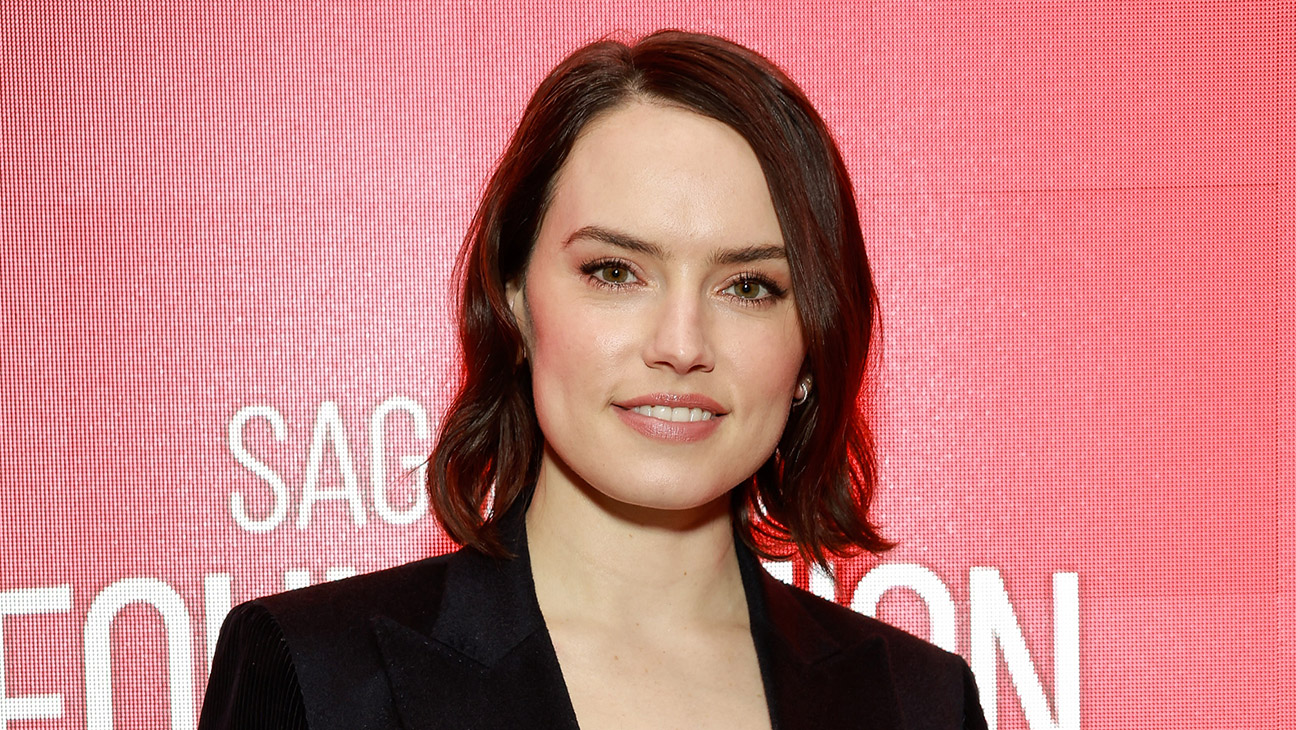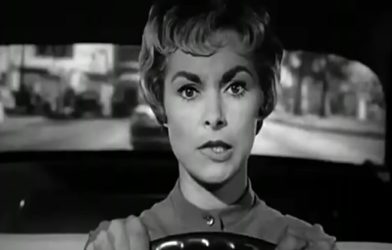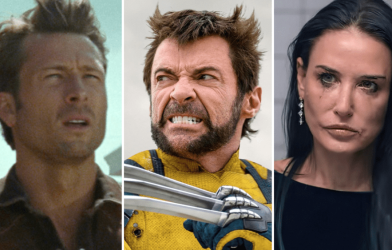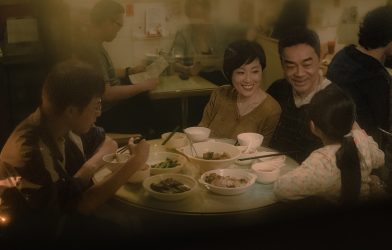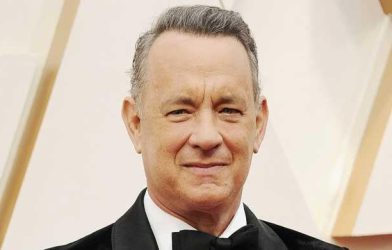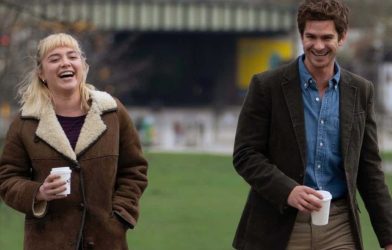It’s quietly been a stellar year for Daisy Ridley.
She began 2024 with the critically acclaimed offbeat dramedy Sometimes I Think About Dying, only to follow it up with arguably the finest performance of her career as legendary swimmer Gertrude Ederle in Young Woman and the Sea. And she concludes this period of time with her most personal work to date, Magpie, a modern noir that she conceived and produced.
Directed by Sam Yates, the well-received Magpie chronicles the fractured marriage of Annette (Ridley) and Ben (Shazad Latif), all while their young daughter Matilda (Hiba Ahmed) acts in a period piece film. Ben, who volunteered to look after his daughter on set, then becomes infatuated with Alicia Romano (Matilda Lutz), the Italian star who’s playing Matilda’s mom in the fictional film within the film. Ben’s wandering eye is well-known, so Annette must finally decide whether she’s going to take a stand or not.
In a previous role as a mother, Ridley’s young co-star referred to her as “mommy” off camera, kickstarting her fascination with the thin line that separates fantasy from reality. She then pitched an idea to her actor husband, Tom Bateman, who’s been discreetly honing his screenwriting chops for some time now. Bateman then went to work during Covid on what would become the Magpie screenplay, but after a few weeks, the perspective of the piece shifted.
“Initially, I thought it’d be interesting to follow the actress, someone who’s away from home and has had something destabilize her and what those relationships on set might signify,” Ridley tells The Hollywood Reporter. “But a few weeks into writing, Tom said, ‘I would just feel a lot more drawn to the mom at home who isn’t able to be on set and isn’t able to have this exciting filming experience.’ So he really ran with it from there.”
Ridley still added her fingerprints to the script in plenty of ways. For example, Annette’s daughter, Matilda, was named after the title character in Ridley’s favorite movie, Matilda (1996). There’s also a pancake-making scene that’s a bit of an homage to the latter. The main couple, Annette and Ben, were named after her brother-in-law and sister in-law, and there’s a dinner scene in which Alicia endures Annette and Ben’s marital strife, something Ridley has experienced to a less dramatic degree. Even Ridley’s own mother appears as a background artist.
“I thought she was going to have lunch with me on set. Instead, she went for lunch around the corner,” Ridley says mid-laugh.
As for Star Wars, Ridley had a unique encounter this past June during a trip to Disneyland. She first rode Star Wars: Rise of the Resistance and witnessed her own handiwork during Rey’s holographic introduction to the attraction. Afterwards, she then came face to face with a costumed cast member who was playing her signature character.
“It was really trippy when I finally met ‘myself.’ The woman I met had studied me, and that was really strange,” Ridley recalls. “Watching someone who has studied me, play me, that was meta, but she did an amazing job. She also didn’t break character. I don’t think I will ever get used to things like that.”
The interaction increased her anticipation for her own eventual return to the character in Sharmeen Obaid-Chinoy’s Star Wars: New Jedi Order, although she admits there’s a touch of fear, as well. (After this conversation, news broke that the film had lost screenwriter Steven Knight.)
“I feel like the new one/new ones will be so interesting. Time has passed and a lot has changed for me, personally, so it’ll be interesting to come back to someone who I know so well, but in such a different moment,” Ridley says. “For me to inhabit Rey again after all the time that we haven’t seen her, it’s actually scary, but it’s also exciting.”
Below, during a recent conversation with THR, Ridley also discusses how her own haircut inspired a line of dialogue in a key Magpie scene.
I realize that Magpie is a work of fiction, but have you witnessed set visitors flying too close to the sun? Is that what got the ball rolling on your idea?
Funnily enough, not at all. I’ve been out to dinner with people in relationships, and you think, “Oh my God, oh my God.” You don’t know what to say because it’s their relationship, but you’re like, “Oh my God, what is this?” So I’ve witnessed that, but no, I haven’t witnessed a set visitor go too far. (Writer’s Note: Ridley brought up awkward dinners because Magpie has its own uncomfortable dinner scene where Matilda Lutz’s actor character has to watch Ridley’s Annette and Latif’s Ben argue.)
Shout out to my mom. I haven’t actually mentioned this, but she is a supporting artist in this film. When she came to set, I made sure she was really well taken care of. Everyone was. She talked about stealing a sausage for the dog, and then I thought she was going to have lunch with me on set. Instead, she went for lunch around the corner. She didn’t have lunch with me. (Laughs.)

Daisy Ridley as Annette in Magpie
Rob Baker Ashton
Magpie, in some ways, feels like an ode to working mothers — or mothers who had to give up their careers to raise their children. Is there some validity to that?
I think it’s more about people that have compromised heavily for their partner. We really wanted to be sure that the kids in the film are never the driving factor for the difficulties that Annette is facing, and Annette and Ben, as a couple, are facing. She loves being a mom. It’s difficult, but she loves it. It was actually Ben who wanted to move to the country and find somewhere quiet to get his creative expression going. So she said yes and had another baby, and because of that compromise she made in terms of being away from a community and a support system, that is actually the thing that’s incredibly difficult. I’m not a mom, but in speaking to a lot of people who have children, it’s less difficult if you have a support system. There’s the phrase, “It takes a village to raise a child.” So Ben and Annette’s relationship is really difficult, and because she is so isolated and doesn’t have someone to be a soundboard for her, all of the things that might be bearable for her are unbearable because she’s alone.
Did you pitch the idea to your partner Tom Bateman to write? Or did he ask if he could run with it after listening to you talk about it?
I pitched it to him. He’s written a few scripts that are all beautiful, so I knew he could write. The original idea that I had was slightly different, but I pitched to him and then he started writing it. Initially, I thought it’d be interesting to follow the actress, someone who’s away from home and has had something destabilize her and what those relationships on set might signify. It’s very intimate on a set. You’re working with people 12 to 14 hours a day, and those bonds are very quickly formed. So that was the original idea. But a few weeks into writing, Tom said, “I would just feel a lot more drawn to the mom at home who isn’t able to be on set and isn’t able to have this exciting filming experience.” So he really ran with it from there, but I had asked him to write it.
It’s well-documented that you’re a Matilda (1996) superfan, and that happens to be Annette’s daughter’s name. (She goes by Tilly for short.)
(Laughs.) You’re the first person to mention it!
So were you chipping in little details like that as Tom was writing?
Yes, there were a few odes to people we love. The character names [Annette and Ben] are actually based on my brother and sister-in-law. We kept saying, “Are you sure?” And they said, “Yeah.” Matilda was my choice, yes, and the pancake dance felt reminiscent of that moment in Matilda. But then it was quite strange because Matilda Lutz plays Alicia, and then we had an amazing camera assistant called Tilly [Garland], so it was a very strange coming together of Matilda-ness. But, yeah, you’re the first person to mention that.

Daisy Ridley as Annette, Hiba Ahmed as Matilda and Matilda Lutz as Alicia in Magpie
Rob Baker Ashton
As a producer, I presume you gave notes on Tom’s early drafts, and that can obviously be a sensitive process. Did you have to tiptoe at first?
Usually, he waits a lot longer to show me, but he’d get up to write every morning during Covid. It was an isolating time, so he would get up and write for hours. And then, in his words, he would walk up and down, chain-smoking, while I read however many pages he’d written. And I’d either go, “Yeah, this is the right direction for what I was imagining,” or, “This is a slightly different direction from what I was imagining.” And that was how we basically sculpted the whole thing. And then, when producer Kate [Solomon] came on board, she was part of that creative process too. Sam Yates, our director, then came on, and it was really the most wonderful symbiotic process, because we all knew what story we wanted to tell and how we wanted to tell that story. So things changed slightly here and there, as things do, but we were so unified on what we wanted to make.
When I last spoke to you for Young Woman and the Sea, it didn’t sound like you asked Jerry Bruckheimer to take you to Skellig Michael and train you in the art of producing.
(Laughs.)
But did you lean on any past producers for some form of guidance?
The producers I really leaned on in a very fundamental way for this film were those on Sometimes I Think About Dying. I was on that set when Magpie was coming together. So I was actually filming in Astoria [Oregon] when we were having director meetings, and so I actually asked Alex Saks, Dori Rath and Steve Wesiman [for guidance]. It was such a wonderful group of producers on that film, and because we were putting Magpie together at that time, they were really gracious enough to talk to me about budget and schedule and things like how many locations one might need to facilitate a certain budget. So the producers of Sometimes I Think About Dying, particularly in the very early stages of getting Magpie together, were amazing.
It’s quite common for young mothers to cut their hair short since they have less time for themselves. Plus, Annette’s hair was in contrast to Ben and Alicia’s long hair. Were those the actual ideas behind going to that length?
I had actually already cut my hair, and when I cut my hair, someone said to me, “That is so brave.” And I remember thinking, “People who operate and save lives are brave. Cutting your hair? What!?” It’s such a weird thing that people say, and I’m not the only woman who has expressed the same thing. So it just so happened to fall like that, and it added a bit of humor to that scene in the park when Esther says “so brave” [in response to Annete’s short hair].
Did you also repurpose your own trailers for the scenes involving the characters’ trailers?
Yeah, Translux, who did our facilities, were absolutely amazing, and their trailers have actually never been shot on camera, so they were featured on screen. Also, crew often do not want to be on film, and so we were also really careful about that. We asked, “How does everyone feel about being on film?” And all of our crew said yes, which was hilariously meta and amazing. So a lot of those crew members had never been filmed before either.
When you shoot a film set within a film set, are you basically using the leftover equipment that your production isn’t using at the time?
Yeah, within the shots, we were using equipment that we had, and then there were a few times where we were like, “Wait, the film within the film, how are we viewing this?” Because Annette is still viewing the film within the film. So we used our crew members and equipment on camera. We were resourceful and used what we had.

Daisy Ridley as Annette in Magpie
Rob Baker Ashton
Annette has quite the arc. Would you say the third-act version of her is more transformative than performative?
Interesting. I would probably say that the second act feels the most transformative to me. I feel like the underbelly of Annette is always solid. She is bashed, she is bruised, she’s having a difficult time, but even if it’s a tiny splinter, there is always something there that is solid for her children. We start when Annette and Ben’s relationship is difficult, and the second act is the most difficult for her, emotionally, because there are things coming at her left, right and center. And the minute that it then involves the children is when things cannot go on like that anymore.
I suppose there is a certain level of lying we can say to ourselves when we think that other people aren’t witness to what’s going on. Annette can withstand this difficulty at home and keep it private, but in the park, when it becomes public, it’s so shameful. And that’s the moment where Annette realizes that everyone has bore witness to her husband cheating on her, and him leaving and coming back, and the difficulties that she’s put aside.
So I always felt in playing her that the second act was the most temperamental, and then, once we’re on that track from the second portion of the film, her sort of steel that was always there is growing. The calm is also coming as she is gathering the strength to actively involve herself in what’s going on.
Was their second child, Lucas, conceived before or after Ben’s eight-month-long “research” trip?
The timeline for me was that the conception happened soon after he got back. So the baby felt like a great reason to stay together and try to make it work again.
Every single day, at least a couple people wake up and get ready for their job, which is to resemble you at two different theme parks in the States. That character is an extension of you. Is there any getting used to that?
(Laughs.) No! It was really trippy when I finally met “myself.” I had been on the Rise of the Resistance ride for the first time, and I was like, “This is insane!” I remember filming [Rey’s holographic introduction], and that ride is unbelievable. I then went and met the person that was inhabiting Rey, and I had been told that the [costumed cast members] study the performances in the films. So the woman I met had studied me, and that was really strange. Watching someone who has studied me, play me, that was meta, but she did an amazing job. She also didn’t break character. But, no, I don’t think I will ever get used to things like that.
After seeing her take on Rey, did that make you itch even more to return to your character?
Yeah, it was really joyful, and I feel like the new one/new ones will be so interesting. Time has passed and a lot has changed for me, personally, so it’ll be interesting to come back to someone who I know so well, but in such a different moment. For me to inhabit Rey again after all the time that we haven’t seen her, it’s actually scary, but it’s also exciting.
You were actually shooting Magpie when Kathleen Kennedy invited you to breakfast to break the good news regarding a new Rey movie. Have you been able to send her a link to Magpie yet?
No, I haven’t yet. I’ll be sending prompts to all the people that I know and love in the States to go and see it [this weekend]. I actually sent J.J. [Abrams] an early cut. We did a few feedback things with various different people. So J.J. has seen it unfinished, but no, Kathy hasn’t yet.
Lastly, I was happy to see some awards efforts being made for Trudy and Young Woman and the Sea. Overall, have you felt some much-deserved love for that performance?
Yeah, I’ve felt really, really moved. It’s also been really beautiful because a lot of people are watching it on planes now. So I’ve felt really, really moved by it. I feel moved not only for people being lovely about me and about the film, but [screenwriter] Jeff Nathanson was contacted by some of [Trudy’s sister] Meg’s extended family. Trudy didn’t have children. So the people from Meg’s family who got in touch are really happy with the film. We wanted to bring Trudy’s story to light, and I feel like we did that and honored her well. So that is a really, really amazing feeling.
***
Magpie is now playing in movie theaters.

